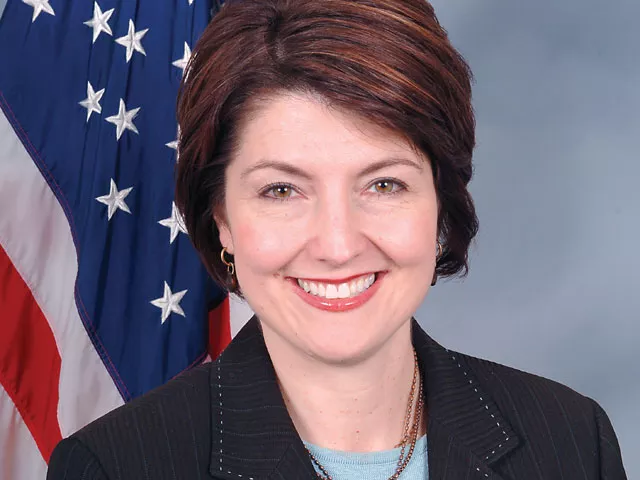It’s rare for a member of Congress to serve an uncontested four-year term. Usually they go into their district’s trenches every two years to battle for re-election, gripping hands, kissing babies and begging for donations.
Not so for Cathy McMorris Rodgers.
Of all the seven congressional districts in Washington, only the 5th has one candidate — McMorris Rodgers. Of the 34 candidates running in these seven districts, she has more money sitting in the bank than all but three of them and, with that, laid the groundwork for a fierce campaign. She’s a member of the minority party and devoted to the relatively powerless GOP in D.C.
So where’s her Democratic challenger?
“I’m not sure somebody affiliated with the Democrats is going to take her on,” says Mark Mays, McMorris Rodgers’ challenger in 2008. Six months from Election Day and not one Democrat has even hinted at interest in the race. “It’s getting a little late in the day,” Mays says.
From the chair of the Spokane County party to the chair of the state party, top Democrats are saying the same thing: no candidate has emerged and it’s too late to ramp a serious challenge to the congresswoman.
Democratic state Sen. Chris Marr, whose name comes up every election cycle as a potential challenger to McMorris Rodgers, says “every star is aligned against the ability of the Democrats to recruit somebody good” to take her on.
“It’s probably not a great year for Democrats, especially in a Republican district,” Marr says.
Facing re-election himself this year, Marr is speaking from personal knowledge. When he was first elected in 2006, he took a seat that had been held by Republicans since 1940. Now he’s up for re-election against a potentially strong challenger, Michael Baumgartner.
Nationally, the pundits tell us 2010 is shaping up to be a year of Republican gains in D.C. The struggling economy and potential for a conservative backlash against Obama’s successes have led to many predictions of a GOP sweep similar to what happened in 1994, when Newt Gingrich and the “Republican Revolution” gave the GOP control of the House for the first time in 40 years.
On the west side of the state, Congressman Brian Baird’s retirement has left Democrats struggling to keep control of the Portland suburb. And Democrat Suzan DelBene, a former Microsoft executive, has mounted a well-funded challenge to three-term GOP incumbent Dave Reichert. These money races have drained resources from Eastern Washington.
“It’s very difficult to ask a candidate to walk off the plank,” Marr says.
“I heartily encourage any progressive to run against Cathy,” says Don Barbieri, who faced McMorris Rodgers in 2004, raised $1.6 million and lost by 20 percentage points. “Whether a person is ultimately successful or not, putting forward the values that progressives talk about and having that national debate in the 5th District is really healthy.”
The debate could just be about conservative values. McMorris’ only challenger is Randall Yearout of the rightwing Constitution Party. And according to the Washington Post, McMorris Rodgers votes Republican 96.7 percent of the time. (The average Republican votes with the party 88.2 percent of the time.) She is considered a “far-right Republican” by GovTrack.us, an independent, nonpartisan Website that determines ideological labels according to sponsorship of legislation.
Which could be why she’s swept each of the last three elections — by as much as 30 points.
“In Eastern Washington … for somebody to win, you have to hit on all cylinders,” says Sharon Smith, vice chair of the state Democratic Party. “It’s really hard to run against somebody that’s won so handily in the past.”
Part of Smith’s job, and her duty as a Spokane resident, is to cajole people into entering the race. In the past six months, Smith says she’s worked with a couple of potential candidates — whom she wouldn’t name — to no avail. But she’s still hopeful.
“I’m hoping that somebody will at least step forward and speak the other side of the issue,” Smith says.
If not, there’s always 2012.
“I have more people this year than any previous year saying, ‘I’m building for 2012,’” Smith says, pointing to the year when President Obama is back on the ballot. And if he or she decides early enough, the candidate might have a chance to do the impossible in the 5th, as George Nethercutt did when he unseated Tom Foley, then Speak of the House, in 1994.
“Tom Foley said winning an election is 90 percent luck, 10 percent skill,” Smith says.

